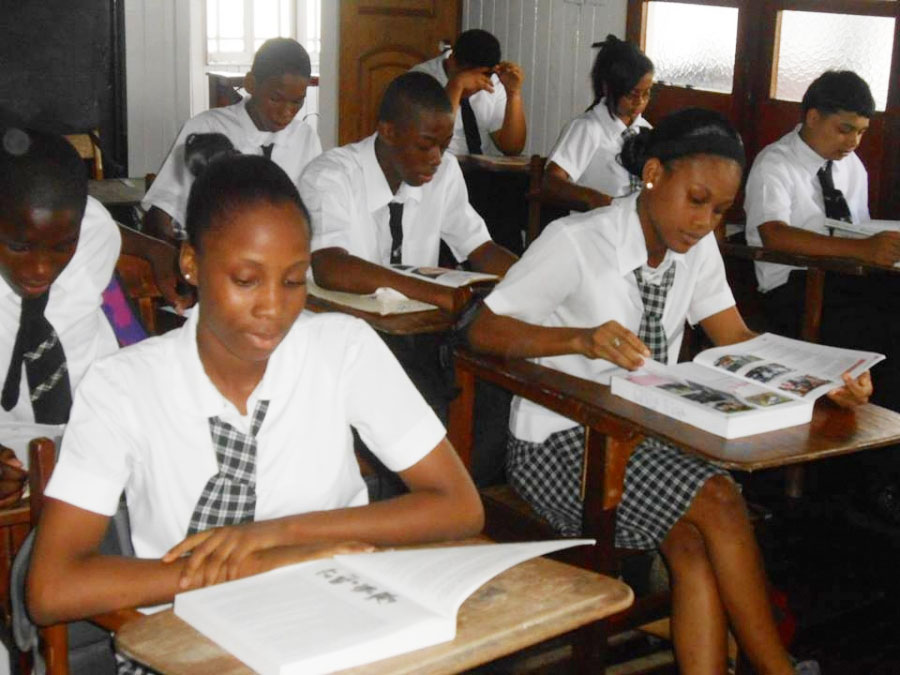Trinidad and Tobago is not the only country in the Caribbean facing resource-related problems arising out of attempts to throw virtual tuition into the mix in order to find feasible alternatives to the coronavirus-stricken conventional education system, but is has probably been the first country in the region to place its problems ‘at the door.’
On Tuesday, the Trinidad Guardian ventured an article in which it cited the challenge of affordability associated with parents in poor communities seeking to have their children access the virtual option to the classroom regime which has had to be set aside in the wake of the pandemic.
It transpires that residents of the working class Chatham Village in the twin-island republic, where unemployment is reportedly high, are having ‘the devil’s own job’ to finance the technology-related inventory, not least desktops, laptops, tablets and cellular phones that are necessary for participation in virtual classes.
But those are not the only challenges. Even if, by some quirk of faith such inventory can be acquired there are the chronic problems like unreliable electricity (and water supply) and internet access being endured by the residents of Chatham Village that bar the way to virtual learning.
The Guardian article, authored by Akash Samaroo, points to the case of Chatham Village resident Nandraka Henry whose children, it seems, try to keep up with the learning challenge but have grown used to the experience of “a missed week of school assignments.” Henry’s particular problem reposes in the fact that the affordability challenges associated with virtual learning compel her to pursue the option of traveling to her children’s school to get hold of “the printed paper-based assignments offered to students who don’t have online access.” At one time or another, it is either a matter of bus fares to get to the school and back or else, the logistics of receiving work on-line from the sole phone which the household shares and which only makes and receives calls. In other homes children have to take turns in using phones to access assignments.
Samaroo, whose article embraced conversations with several other residents of Chatham Village says that across the board, the problems are identical.
The residents of Chatham Village, will, no doubt, take cold comfort from the fact that they are not the only poor community in the Caribbean enduring this problem. In Guyana, efforts to offer a limited virtual teaching/learning regime in the absence of a conventional classroom one have been beset by identical problems…and more. Equipment key to the creation of a two-way communication regime to effect the virtual curriculum is not readily available across the board, not just on account of affordability but because the demand for laptops worldwide, for example, has meant that they are none readily available in stores at this time. Beyond that the absence of communication infrastructure has literally cut off huge swathes of the country from access to virtual education.
“You can say that it is probably the best that there is, but I’m not sure that it is working,” an East Coast Demerara teacher told the Stabroek Business. “Teachers were not trained for this. Some of us have learnt to use computers on our own but there is a certain psychology associated with teaching virtual classes that is entirely different to the seats-on-benches-teacher-in-charge method. Discipline and commanding attention are critical
elements in the teaching/learning process. Interaction as also important. If you do not have those you are at a huge disadvantage.”
A serving secondary school teacher who possesses Information Technology training outside the realm of his teaching experience agrees. “If the assumption was that we could simply shift from conventional education delivery to a virtual approach then something must be wrong with all of us. It is not just a question of phones, laptops and internet access. The methods associated with virtual teaching, particularly how you encourage, receive and manage feedback are critical. It is important to note that despite the risks of contracting coronavirus, large numbers of parents have sent their children back to the classroom. My feedback tells me that they are far more comfortable with the culture of discipline associated with the classroom.”
Earlier this week a Georgetown secondary school Deputy Head Teacher told the Stabroek Business that a number of teachers were now working in both the actual teaching/learning system as well as the virtual one. “Now that schools have a limited opening they teach their conventional classes and afterwards they work with small groups in virtual classes. I’m not sure about the extent to which it happens, but I know it does. Parents sometimes believe in giving their children what we call ‘every little extra.’ Who knows, even beyond COVID-19 a certain amount of small-group virtual teaching may be here to stay. Certainly, there is the possibility that it can be developed and turned into a lucrative business down the road. “









